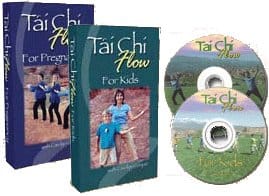Happy Anniversary to Tai Chi Flow!
 This month is Tai Chi Flow’s anniversary month. Join us in celebrating by purchasing a Tai Chi Flow for Kids or Tai Chi Flow for Pregnancy DVD for half price for a limited time.
This month is Tai Chi Flow’s anniversary month. Join us in celebrating by purchasing a Tai Chi Flow for Kids or Tai Chi Flow for Pregnancy DVD for half price for a limited time.
Did you know that according to the Albany (NY) Times-Union, tai chi is one of the top 20 exercise trends for 2010? It’s true. Tai Chi continues to grow in popularity in the West, thanks to its numerous health benefits (according to Harvard Medical School):
Muscle strength. In a 2006 study published in Alternative Therapies in Health and Medicine, Stanford University researchers reported benefits of tai chi in 39 women and men, average age 66, with below-average fitness and at least one cardiovascular risk factor. After taking 36 tai chi classes in 12 weeks, they showed improvement in both lower-body strength (measured by the number of times they could rise from a chair in 30 seconds) and upper-body strength (measured by their ability to do arm curls).
In a Japanese study using the same strength measures, 113 older adults were assigned to different 12-week exercise programs, including tai chi, brisk walking, and resistance training. People who did tai chi improved more than 30% in lower-body strength and 25% in arm strength — almost as much as those who participated in resistance training, and more than those assigned to brisk walking.
“Although you aren’t working with weights or resistance bands, the unsupported arm exercise involved in tai chi strengthens your upper body,” says internist Dr. Gloria Yeh, an assistant professor at Harvard Medical School. “Tai chi strengthens both the lower and upper extremities and also the core muscles of the back and abdomen.”
Flexibility. Women in the 2006 Stanford study significantly boosted upper- and lower-body flexibility as well as strength.
Balance. Tai chi improves balance and, according to some studies, reduces falls. Proprioception — the ability to sense the position of one’s body in space — declines with age. Tai chi helps train this sense, which is a function of sensory neurons in the inner ear and stretch receptors in the muscles and ligaments. Tai chi also improves muscle strength and flexibility, which makes it easier to recover from a stumble. Fear of falling can make you more likely to fall; some studies have found that tai chi training helps reduce that fear.
Aerobic conditioning. Depending on the speed and size of the movements, tai chi can provide some aerobic benefits. But in the Japanese study, only participants assigned to brisk walking gained much aerobic fitness. If your clinician advises a more intense cardio workout with a higher heart rate than tai chi can offer, you may need something more aerobic as well.
Alice Lesch Kelly, Fit Pregnancy Magazine contributor and mother of two boys in Newton, Mass. wrote about exercise trends in general and Tai Chi Flow in particular in the magazine:
Tai Chi Tips
Stand with your knees slightly bent, your head in line with your hips, spine erect but not rigid, abdominals drawn in. Move slowly and gently, keeping your legs moving at all times. Breathe in through your nose and out through your mouth, keeping your face “soft” and your jaw relaxed. Keep your tongue on the roof of the mouth just behind your teeth; doing this will actually help you balance correctly. Try to still your mind, focusing on the connection between you and your baby. As your pregnancy progresses, you may choose to do tai chi on a large stability ball, in a chair or in chest-height water. — Teri Hanson
Tai Chi Flow for Pregnancy
This DVD program, designed by Carolyn Cooper, features calming qigong exercises and tai chi movements and is appropriate for all three trimesters.
Again, don’t forget to celebrate Tai Chi Flow’s anniversary by purchasing your own DVD for half price.


Leave a Reply
Want to join the discussion?Feel free to contribute!